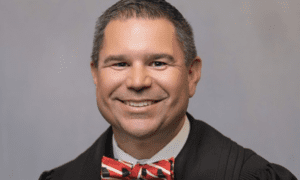Fayette County Attorney Scott Bennett last week responded to criticism from Fayette County School Board Chairman Leonard Presberg that the county’s challenge to the district voting lawsuit filed was causing school system resources to be wasted on legal fees.
At the county commission’s workshop meeting, Bennett noted that the commission had no choice but to challenge the settlement between the school board and the National Association for the Advancement of Colored People. That’s because the settlement featured an admission of a Section 2 violation of the Voting Rights Act, whereas the county contends that no such violation has occurred.
“What the school board did was, they admitted to a liability that we don’t believe exists … that would prejudice our defense. We don’t think we violated Section 2, or any of the Voting Rights Act.” Bennett said.
Bennett noted that in a recent hearing the court determined that the remedy proposed in the settlement did not actually provide relief under the controlling case law in the matter.
“I just want to be real clear that this board has not instructed me or our attorneys to try to interfere with the school board’s operations. It’s merely the fact that our legal position has to be protected and that’s what we’ve done,” Bennett said.
The NAACP filed the suit in federal court last year in an effort to force both the school board and the county commission to switch to a district voting format. District voting would allow voters to cast ballots for just one of the five seats on each board, while the current at-large voting process allows voters to cast ballots for all five seats on each board.
The NAACP contends that district voting, combined with a specially drawn majority-minority district, would make it far easier for a black candidate to be elected to office.
The NAACP has contended that because the county’s black population is now over 20 percent, black residents face having their votes diluted under the county’s current at-large countywide voting system.
The county has argued that the map drawn for the school board districts does not create a district that has a black voting age population of at least 50 percent plus one voter. The largest black voting age population district only reaches the 46.2 percent level.
The court indicated in a recent hearing that case law requires the remedy map to have a black voting age population of 50 percent plus one, as held by case law approved by the U.S. Supreme Court.
NAACP Attorney Ryan Haygood in his oral argument suggested that it would be patently unfair to have black residents in Fayette County wait another 10 years to be able to elect a black person to the school board and county commission.
While no black person has ever been elected to either board, an African-American was appointed to be Chief Magistrate, a county-wide post, and later ran unopposed for a successive term. Judge Charles R. Floyd later passed away after an extended illness but was lauded for his service and commitment to the position.











Leave a Comment
You must be logged in to post a comment.